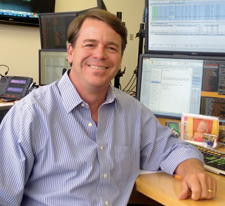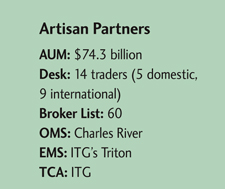Artisan Partners’ search for alpha is endless.
The ongoing search is the job of Derek De Petra, partner and managing director of international trading at the San Francisco-based investment firm. Finding above-market returns for portfolio managers and in block size is the goal he pursues around the globe, regardless of whether it is in Russia, Nigeria or South America.
“We want to make sure we can access liquidity wherever it is,” De Petra said. “It’s that search for liquidity that drives us wherever we have to go.”

The search for performance wherever it can be found tops the thinking Artisan uses when it picks brokers to use, worldwide. And the global nature of the search is why it has relationships now with a large list of brokers, roughly 60 worldwide.
As De Petra sees it, one never knows where liquidity will be found, and that means casting a wide net of brokers to canvass the local international markets.
While he has about 10 brokers he uses regularly, he doesn’t limit himself to one firm or one geographic region. Rather, the opposite.
“If I need to find liquidity in a name, I’ll talk to anyone,” De Petra said. “And the same goes for market intelligence; if it comes from a German bank, or a South American or Russian local, we’ll take that call.”
Finding the right stock at the right price and in the right size is the constant challenge. Whether it’s to find a block of stocks in a frontier market or complete a downhill ski run from a helicopter, De Petra knows it’s about persevering and scouring myriad countries to find the equities his firm needs and portfolio managers want to buy.
And for him, perseverance and tenacity have been hallmark traits since the beginning of his trading career.
A graduate of the University of California, Los Angeles, De Petra got his start in the business during his summer breaks working at broker Merrill Lynch.
Upon graduation in 1993, De Petra was hired by Mellon Capital to work on its West Coast trading desk, getting exposure to program trading, derivatives and futures. His primary focus for the three years was trading stocks for the firm’s international funds.
After Mellon Capital, he joined San Francisco-based Montgomery Asset Management while studying for his Master of Business Administration at the University of California, Berkeley. Balancing the rigors of school during the day and a trading career in international stocks each evening was a challenge. Often, De Petra would trade from 6:30 p.m. to 2:30 a.m., grab some sleep and then go to a 9 a.m. class.
“It was a lot of long hours and lots of coffee,” he reminisced. “I was trading at a time when the emerging markets were developing. I didn’t really sleep. I was working Sunday nights through Thursday six days a week. And classes in between.”
But the payoff was worth it, he said. During this time, he traded through the crash of Asian stocks, the development of the emerging markets in Europe and the Russian debt crisis. It was also the time of the dot-com boom. For De Petra, there was seldom a dull moment.
“It was a crazy but interesting time,” he said. In fact, he called it one of the most interesting times of his entire 20-year career.
At the turn of the millennium, he joined Artisan. He was hired by Mark Yockey, head of the firm’s international growth strategy. Yockey gave De Petra a simple mandate: Grow assets and alpha.
De Petra was immediately charged with trading international growth stocks-primarily buying and selling technology media and telecommunications and Internet-based companies.
Now, 13 years later, Artisan offers a suite of 12 U.S. and global investment funds, including the Global Equity and International Global Value funds, several Domestic Value funds and Domestic Growth funds, with total assets under management reaching $74.3 billion. The funds are managed by five autonomous investment teams, but each sends trades to De Petra and the global trading desks he oversees.
De Petra said having five separate desks for each investment team would be unmanageable.
Therefore, he works a single San Francisco-based trading desk that trades 24 hours a day. That is not to say he doesn’t travel abroad, as he has workstations in New York and London. Each investment team has a point person on the trading desk working its orders, knowing its needs, which makes the desk more efficient.

“It’s hard-trying to have traders associated with the PM teams in a 24-hour trading environment,” De Petra admitted, especially as the firm’s AUM has grown. “We’ve tried to employ economies of scale to balance our growth.”
While some trades still get handled by telephone, De Petra also employs algorithms and dark pools in his search for liquidity and the Holy Grail of international trading: blocks of shares or more at a time. He defines a block of international stock as having a value of 50 percent of the average daily volume traded. His usage of dark pools has increased in the last few years, as liquidity in the lit markets, especially in international emerging markets, has been hard to find. He has traditionally used Liquidnet, which has produced favorable results for Artisan.
“My usage of dark pools has grown in the few years, and we expect it to grow more in the future, but incrementally,” De Petra said.
Also in his trading arsenal are algorithms, which allow his trading intentions to remain anonymous. He uses implementation shortfall and others that seek liquidity in dark pools. That is important in some international stocks, which are very thinly traded, and revealing his intentions can erode hours, if not days of work. He also responds when sent indications of interest-IOIs-from brokers, when possible.
“We’re looking for any liquidity we can get,” De Petra said. “We’re not targeting a percentage of flow in dark pool or in an algo, but if we find liquidity on the high-touch desk or in a pool, we take it.”



